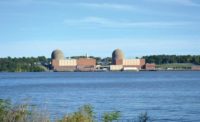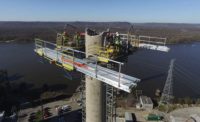The British government laid the ground work for a new generation of nuclear power plants on January 10 when it outlined new legislation to attract investors.
Citing improved security of supply and reduced carbon emissions, the government wants new projects to replace at least some of the roughly 10,000-MW of generating capacity scheduled to be shut down in the next 20 years.
"We are inviting companies to bring forward proposals...it's going to be up to them," says Energy Secretary John Hutton.
To streamline regulatory process, new legislation will simplify planning procedures, site selection and reactor pre-licensing.
However, project developers will have to fund all costs, including decommissioning and long-term waste management, says Tim Stone, a senior government adviser.
Companies will even have to pay the marginal cost of expanding the deep geological repository the government plans to build at some point for existing waste.
Europe's largest utility, Electricité de France, aims to invest in four plants, says a spokeswoman, following the U.K. announcement.
The company would install the same 1,600-MW European Pressurised Water (EPR) type to be used on its French project at Flamville, now beginning construction. The first U.K. plant could be in operation in 2017, she adds.
E.ON U.K., a large utility, "is very keen to get involved in the (nuclear) replacement program," according to Chief Executive Paul Golby. The company is already working with two plant vendors of reactor pre-licensing.
British Energy Group plc., which counts most of the U.K.'s active nuclear assets in its 9,500-MW portfolio, is "ready for new build and have the sites, people, skills and experience that are essential for its success," claims Chief Executive Bill Coley.
British Energy has eight sites next to nuclear plants. It recently negotiated new transmission connections with the national grid operators from 2016 for four sites.
The company will announce in March the partners it has chosen to develop new projects, says a spokeswoman.
Preparing for the new pro-nuclear policy, the U.K.'s regulators recently started, on a contingency basis, pre-licensing of four reactor systems. Lasting about 3.5 years, the assessments are not site related but are intended to speed up later permitting of individual projects.
A short list of at most three likely technologies is due early this year. Competing for acceptance are Canada's Advanced CANDU Reactor, the EPR by Electricité de France/AREVA Group, GE Hitachi Nuclear Energy's advanced Boiling Water Reactor, and Westinghouse Electric Co./Toshiba Corp.'s AP1000 pressurized water reactor.
The environmental group Greenpeace U.K. says "the green light to new build is a bad decision. The public consultation was deliberately misleading to climate change and energy security."
And nuclear critics cite construction difficulties at Europe's only other new nuclear plant as a warning against a U.K. program.
Finland's third unit at the Olkiluoto nuclear facility, Eurajoki, is now running about two years late, largely because of civil engineering problems, according to the owner, Teollisuuden Voima Oy (TVO).
The 1,600-MW EPR plant has also been hit by accidents. A construction worker died from a fall last September. Earlier in the year work stopped when cracks were found in one of the site's 15 tower cranes.





